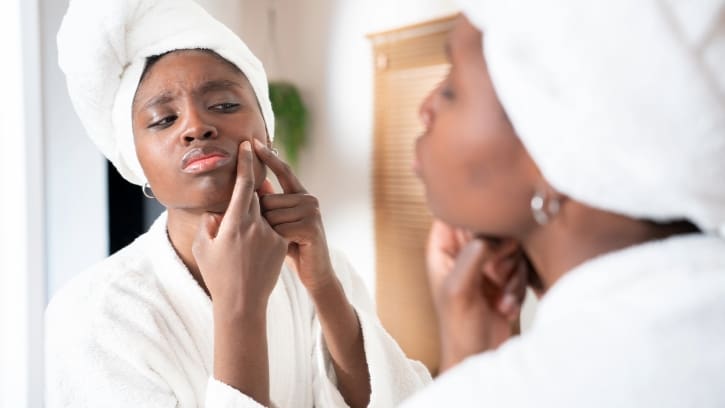People of various ages and backgrounds can suffer from the common skin condition known as acne. Whether you’re a teenager navigating the challenges of puberty or an adult dealing with unexpected breakouts, understanding the causes, effective treatments, and prevention strategies is crucial for achieving clear and healthy skin. We’ll discuss the different facets of acne in this blog post, giving you the knowledge you need to take charge of the condition of your skin.
I. The Basics of Acne:
Acne is a complex skin condition that manifests as pimples, blackheads, whiteheads, and, in more extreme situations, cysts. The back, shoulders, chest, and face are the main areas where these skin imperfections appear. Investigating the causes of acne is crucial to understanding it better.
II. Causes of Acne:
Hormonal Fluctuations:
Adolescence: During puberty, hormonal changes cause an increase in oil production, which in turn causes acne.
Menstrual Cycle: Hormone fluctuations, particularly during the menstrual cycle, may be a factor in female breakouts.
Excess Oil Production:
Sebaceous Glands: Excess oil, or sebum, produced by hyperactive sebaceous glands clogs pores and promotes the growth of bacteria that cause acne.
Bacteria:
Everybody has Propionibacterium acnes on their skin, which can grow in clogged pores and cause inflammation.
Genetics:
Family History: Acne is more likely to run in families because of genetic predispositions to the condition.
Environmental Factors:
Pollution and humidity: By causing skin inflammation, environmental factors can make acne worse.
III. Treatment Options:
Topical Treatments:
Benzoyl Peroxide: Lowers inflammation and eliminates bacteria that cause acne.
Retinoids: Encourage the exfoliation of dead skin cells and clear clogged pores.
Oral Medications:
Antibiotics: Reduce inflammation and bacterial growth.
Oral contraceptives: Control women’s hormone swings.
Lifestyle Changes:
Diet: Research indicates that high-glycemic diets may be associated with acne. Think of a healthy diet that is high in whole grains, fruits, and vegetables.
Skincare Routine: Moisturizing, exfoliating, and gently cleaning the skin can help keep it healthy.
IV. Prevention Strategies:
Maintain a Consistent Skincare Routine:
Cleanse: To get rid of extra oil and dirt, use a mild cleanser.
Exfoliate: Frequently exfoliating the skin helps to avoid the accumulation of dead skin cells.
Moisturize: To preserve the natural equilibrium of your skin, keep it hydrated.
Healthy Lifestyle Choices:
Keep Yourself Hydrated: Adequate hydration promotes healthy skin on the whole.
Balanced Diet: Choose a diet high in antioxidants, vitamins, and minerals.
Handle Stress: Activities that help you decompress should be a part of your routine because stress can make acne worse.
Avoid Triggering Factors:
Makeup and Skincare Products: Choose non-comedogenic products to prevent pore blockage.
Touching and Picking: Avoid touching your face, and resist the urge to pick at blemishes.
The first step to effectively managing and preventing breakouts is understanding acne. You can attain healthier, clearer skin by treating the underlying issues and using a holistic skincare routine. To develop a customized treatment plan that addresses the specific requirements of your skin, speak with a dermatologist. Consistency is essential in the pursuit of acne-free skin.
- The Role of Vitamin D in Skincare: Nourish Your Skin with Clear Essence - February 27, 2025
- How to Deal with Sunburn: Soothe and Restore Your Skin with Clear Essence - February 12, 2025
- The Impact of Hormones on Skin Health: Clear Essence Solutions for Every Stage - January 28, 2025
